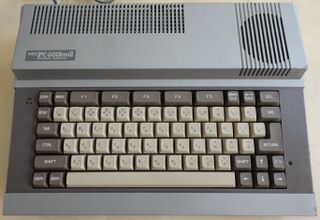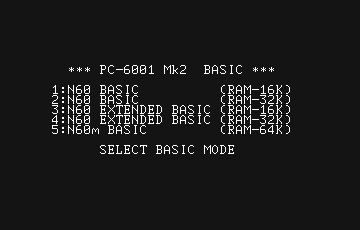Difference between revisions of "PC-6001 mkII"
From NEC Retro
| (2 intermediate revisions by the same user not shown) | |||
| Line 13: | Line 13: | ||
}} | }} | ||
}} | }} | ||
| − | The '''PC-6001 mkII''' is a home computer released by [[NEC]] and upgrade to the [[PC-6001]]. It was released as part of the [[PC-6000 series]]. | + | The '''PC-6001 mkII''' is a home computer released by [[NEC]] and upgrade to the [[PC-6001]]. It was released as part of the [[PC-6000 series]] in 1983. |
The PC-6001 mkII is backwards compatible with all PC-6001 games, but its new graphics modes allow for its own selection of software. | The PC-6001 mkII is backwards compatible with all PC-6001 games, but its new graphics modes allow for its own selection of software. | ||
==Hardware== | ==Hardware== | ||
| − | {{ | + | {{ScreenThumb|PC6001mkII Boot.png|Boot up the system and you'll be given five BASIC mode options.}} |
| − | The PC-6001 mkII is an upgrade over the PC-6001, incorporating several of the computer's add-ons while adding some new features of its own. While the CPU was not changed, the mkII has 64KB of RAM | + | The PC-6001 mkII is an upgrade over the PC-6001, incorporating several of the computer's add-ons while adding some new features of its own. While the CPU was not changed, the mkII has 64KB of RAM (double the amount of an expanded PC-6001), a higher resolution text mode, and two new graphics modes, 320 x 200 (4 colours) and 160 x 200 (15 colours). Voice synthatsis is built into the machine by default, rather than requiring a separate purchase as was the case with the PC-6001. |
| − | Many of these new features are facilitated by the inclusion of a new form of BASIC, "N60m BASIC", however a desire to keep compatibility with the older PC-6001 means the system actually comes equipped with five variants of BASIC. Modes 1 and 2 emulate the stock PC-6001 with 16KB and 32KB of RAM, respectively, while modes 3 and 4 incorporate [[N60 Kakuchou BASIC]], which required a separate cartridge on the older machine. | + | Many of these new features are facilitated by the inclusion of a new form of BASIC, "N60m BASIC", however a desire to keep compatibility with the older PC-6001 means the system actually comes equipped with five variants of BASIC. Modes 1 and 2 emulate the stock PC-6001 with 16KB and 32KB of RAM, respectively, while modes 3 and 4 incorporate [[N60 Kakuchou BASIC]], which required a separate cartridge on the older machine. As the computer continues to use the "page" system of dividing up memory, software was forced to supply both a "mode" and "page number" to ensure users would could run programs correctly. |
| − | + | As a result of this system, most mkII software is designed for BASIC mode 5 and will simply not load on an older PC-6001 machine. There are exceptions, however; the PC-6001 mkII version of ''[[Space Harrier]]'' for example uses mode 2; it can be loaded with an older PC-6001, but graphics will be corrupted and the game will inevitably crash when attempting to run. | |
| − | Slight differences exist in how the PC-6001 mkII handles the older graphics modes; the text-based graphics mode 1 now uses white text on a black background, rather than two shades of green | + | Slight differences exist in how the PC-6001 mkII handles the older graphics modes; the text-based graphics mode 1 now uses white text on a black background, rather than two shades of green, and border colours are often different, with the mkII usually rendering black in the unused space. |
The machine adds an RGB video output, allowing for much cleaner visuals when connected to a compatible monitor, and replaces the chiclet keyboard of the PC-6001 with a full travel alternative, as seen on with other NEC machines of the era. | The machine adds an RGB video output, allowing for much cleaner visuals when connected to a compatible monitor, and replaces the chiclet keyboard of the PC-6001 with a full travel alternative, as seen on with other NEC machines of the era. | ||
| + | |||
| + | Shortly after release the mkII became the de facto PC-6000 series machine, and despite being succeeded by the [[PC-6001 mkII SR]], it contined as the platform of choice for software developers. NEC would also release the [[PC-6601]], which is almost identical to a PC-6001 mkII and can run the same software; connecting an external 3½-inch floppy disk drive to a PC-6001 mkII essentially turns it into a PC-6601, save for minor differences in audio. | ||
===Technical specifications=== | ===Technical specifications=== | ||
==List of games== | ==List of games== | ||
| − | {{ | + | {{BulletPointGameList|PC60mk2}} |
| − | |||
| − | |||
| − | |||
| − | |||
| − | |||
| − | |||
| − | |||
==References== | ==References== | ||
Latest revision as of 12:24, 11 February 2022

| ||||||||||

| ||||||||||
| PC-6001 mkII | ||||||||||
|---|---|---|---|---|---|---|---|---|---|---|
| Manufacturer: NEC | ||||||||||
|
The PC-6001 mkII is a home computer released by NEC and upgrade to the PC-6001. It was released as part of the PC-6000 series in 1983.
The PC-6001 mkII is backwards compatible with all PC-6001 games, but its new graphics modes allow for its own selection of software.
Hardware
The PC-6001 mkII is an upgrade over the PC-6001, incorporating several of the computer's add-ons while adding some new features of its own. While the CPU was not changed, the mkII has 64KB of RAM (double the amount of an expanded PC-6001), a higher resolution text mode, and two new graphics modes, 320 x 200 (4 colours) and 160 x 200 (15 colours). Voice synthatsis is built into the machine by default, rather than requiring a separate purchase as was the case with the PC-6001.
Many of these new features are facilitated by the inclusion of a new form of BASIC, "N60m BASIC", however a desire to keep compatibility with the older PC-6001 means the system actually comes equipped with five variants of BASIC. Modes 1 and 2 emulate the stock PC-6001 with 16KB and 32KB of RAM, respectively, while modes 3 and 4 incorporate N60 Kakuchou BASIC, which required a separate cartridge on the older machine. As the computer continues to use the "page" system of dividing up memory, software was forced to supply both a "mode" and "page number" to ensure users would could run programs correctly.
As a result of this system, most mkII software is designed for BASIC mode 5 and will simply not load on an older PC-6001 machine. There are exceptions, however; the PC-6001 mkII version of Space Harrier for example uses mode 2; it can be loaded with an older PC-6001, but graphics will be corrupted and the game will inevitably crash when attempting to run.
Slight differences exist in how the PC-6001 mkII handles the older graphics modes; the text-based graphics mode 1 now uses white text on a black background, rather than two shades of green, and border colours are often different, with the mkII usually rendering black in the unused space.
The machine adds an RGB video output, allowing for much cleaner visuals when connected to a compatible monitor, and replaces the chiclet keyboard of the PC-6001 with a full travel alternative, as seen on with other NEC machines of the era.
Shortly after release the mkII became the de facto PC-6000 series machine, and despite being succeeded by the PC-6001 mkII SR, it contined as the platform of choice for software developers. NEC would also release the PC-6601, which is almost identical to a PC-6001 mkII and can run the same software; connecting an external 3½-inch floppy disk drive to a PC-6001 mkII essentially turns it into a PC-6601, save for minor differences in audio.
Technical specifications
List of games
- 3D Golf Simulation
- 3D Golf Simulation Super Version
- 3D Tank Combat
- American Truck
- Aspic
- Bean's Jack
- Binary Land
- Biotech
- The Black Onyx
- Bokosuka Wars
- Bomber Man
- Bomber Robo
- Bosconian
- Bubble Kund 1999
- Busy on Rainy Days
- Cannon Ball
- Castle Excellent
- The Castle
- Chack'n Pop
- Choplifter
- Chrith Ai no Tabidachi
- Color Ball
- Combat-47
- Corridor
- Crab Planet
- Cross Country
- Dai Dassou
- David's Midnight Magic
- Dezeni Land
- Dig Dug
- Dimensional Wars
- Do Re Me Kyoushitsu
- Dr. Slump: Bubble Daisakusen
- Excite Yonin Mahjong
- Field Wars
- Fire Rescue
- Fireball
- Flappy
- Front Line
- Fruit Panic
- Galaxian
- Gang Man
- Gatchan no o Hyakudomairi
- Ginkou Goutou
- Golf Island
- Golf Island Kakuchou Course 2
- Golf Island Special
- Graphic Hanafuda
- Grobda
- GTX II 1
- GTX II 2
- GTX II 3
- GTX II 4
- Guttang Gottong
- The Hanafuda
- Help!
- Hisha
- Hitsuji Yai
- Hiyoko Fighter
- Hoi Hoi
- Hurry Fox
- Hurry Fox Yuki no Maouhen
- Ice Block
- Insuu Bunkai
- Itasundorious
- Jackie Chan no Project A
- Jackie Chan no Spartan X
- Jan Kyou
- Jelda
- Jinkou Chinou Gill
- Jinsei Game High & Low
- Justice Knight
- Kaeru Shooter
- Karuizawa Yuukai Annai
- Keiko-chan no Himitsu
- Ki Nasai!
- Killer Station
- Mappy
- Mario Bros. Special
- Mint Mark no Daibouken
- MJ-05
- Mobile Suit Gundam Luna Two No Tatakai
- Mr. Butterfly
- Mr. Hanafuda
- Mystery House II
- Nankyoku Monogatari
- Nausicaä Kiki Ippatsu
- New Fan Fun
- Nuts & Milk
- Pac-Man
- Parodic Momotarou
- Pascon Tower
- Pasokon Karaoke
- Pennant Race
- The Planetarium
- Plazma Line
- Police Dog
- Power Fail
- Professional Mahjong
- Punch Ball Mario Bros.
- Pyramid II
- Real Golf Game
- Salad no Kuni no Tomato Hime
- Sanjigen Bomberman
- Sea Bomber
- Senryaku!! Rengou Kantai
- Sky Diver
- Sokoban
- Sore Yuke Kuru Kuru
- Sore Yuke Tonkachi-kun
- Space Harrier
- The Spider
- Spy-0011
- Square Garden
- Star Arthur Densetsu I Wakusei Mephius
- Star Arthur Densetsu II Ankoku Seiun
- Star Arthur Densetsu III Terra 4001
- Star Destroyer
- Star Fleet/B
- Star Stream
- Submarine Shooter
- Suidou Kozou
- Super Doors
- Super Graphic Editor
- Thunder Force
- Time Secret
- Time Tunnel
- Tiny Xevious mkII
- Tritorn
- Vandal
- Vegetable Crash
- Victorious Nine
- Volguard
- Wing Man
- Yakyuu Kyou
- Yonin Mahjong
- Youkai Tantei Chima Chima
- Zero Fighter
References
| PC-6000 series hardware |
|---|
| PC-6001 (NEC TREK) (1981) | PC-6001 mkII (1983) | PC-6001 mkII SR (1984) |
| stuff |
| put something here |
